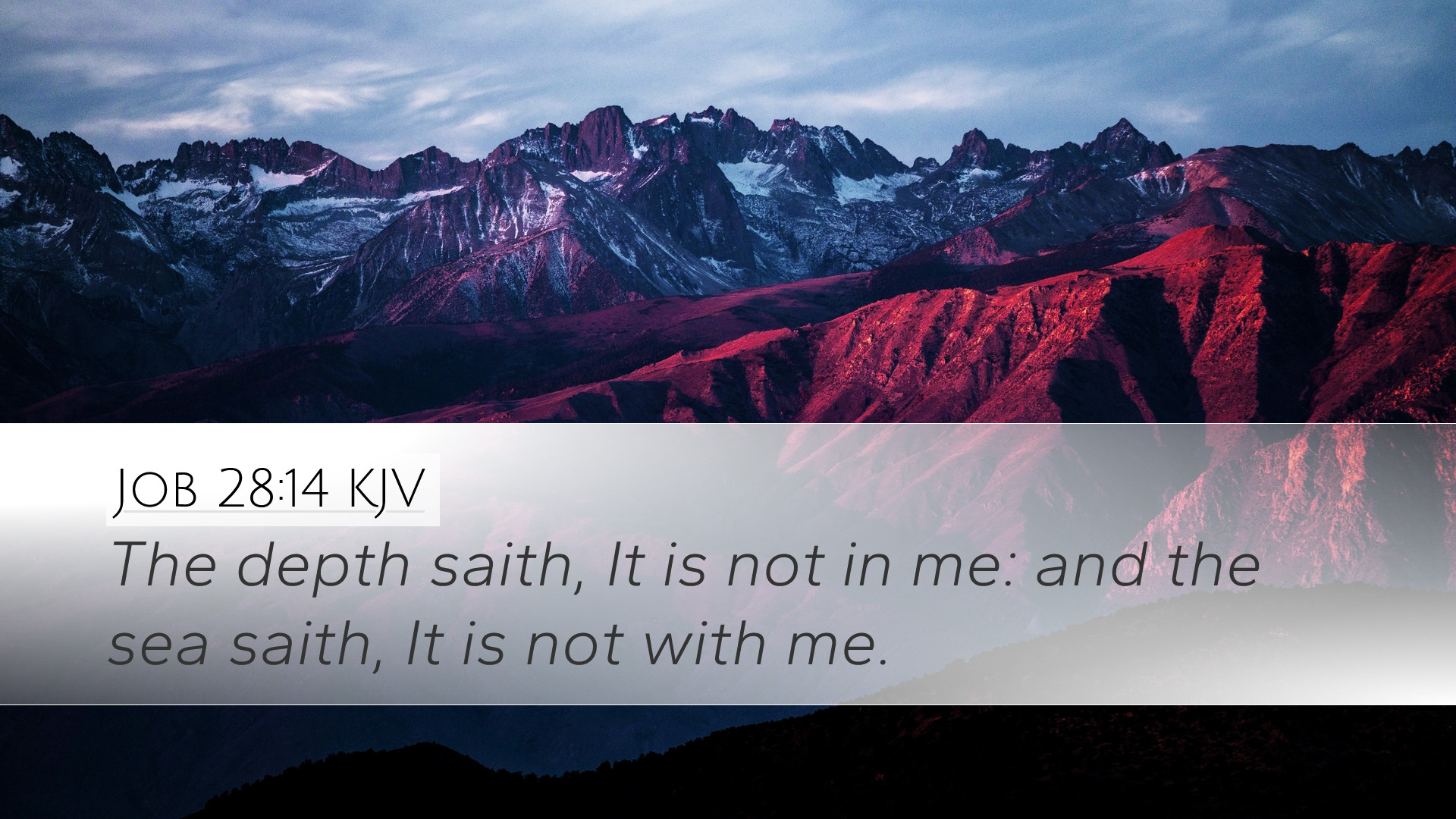Old Testament
Genesis Exodus Leviticus Numbers Deuteronomy Joshua Judges Ruth 1 Samuel 2 Samuel 1 Kings 2 Kings 1 Chronicles 2 Chronicles Ezra Nehemiah Esther Job Psalms Proverbs Ecclesiastes Song of Solomon Isaiah Jeremiah Lamentations Ezekiel Daniel Hosea Joel Amos Obadiah Jonah Micah Nahum Habakkuk Zephaniah Haggai Zechariah MalachiJob 28:14
Job 28:14 KJV
The depth saith, It is not in me: and the sea saith, It is not with me.
Job 28:14 Bible Commentary
Commentary on Job 28:14
Job 28:14 states, "The depths say, 'It is not in me'; and the sea says, 'It is not with me.'" This verse segues into a profound exploration of wisdom, its nature, and its elusive qualities. Each public domain commentary offers a layered understanding of this verse, providing insights that are incredibly beneficial for pastors, students, theologians, and Bible scholars.
Contextual Background
The Book of Job is an exploration of profound themes, primarily focused on suffering, divine justice, and the quest for wisdom. Chapter 28, in particular, stands out as a poetic interlude where Job’s discourse leads to a meditation on wisdom's inaccessibility and value. This chapter asks fundamental questions regarding the nature of wisdom, setting the stage for the verse at hand.
Insights from Matthew Henry
Matthew Henry's commentary emphasizes that this section highlights the contrast between the worldly pursuit of wisdom and its true essence. He notes:
- Human Limitations: Henry indicates that even the depths of the earth, where precious metals are mined, declare that wisdom is not to be found within them. This suggests that earthly riches and knowledge do not equate to true wisdom.
- The Sea's Silence: The sea, often a symbol of chaos and depth, also asserts that wisdom is not found in its vastness. This illustrates the point that wisdom transcends worldly knowledge and material possessions, emphasizing its divine origin.
- Seeking Wisdom: Henry stresses the importance of understanding that true wisdom eludes human grasp and is ultimately sourced in God. The implications of seeking wisdom necessitate a humble acknowledgment of our limitations.
Insights from Albert Barnes
Albert Barnes provides a detailed objective analysis of the implications of Job 28:14. He articulates that:
- Metaphorical Depths: Barnes interprets the "depths" and the "sea" metaphorically, each representing the ordinary realms of human exploration, yet both admit the secret of wisdom lies beyond them.
- Helplessness of Creation: He argues that these elements of creation (depths and sea) symbolize mankind’s inability to discover wisdom through their own means, capturing the essence of human helplessness.
- Divine Wisdom: Importantly, he identifies the stark difference between human reasoning and divine wisdom, suggesting that while humans may find knowledge through study, true wisdom requires divine revelation.
Insights from Adam Clarke
Adam Clarke expands on the symbolism presented in Job 28:14 where he emphasizes:
- Philosophical Inquiry: Clarke engages with the philosophical implications of the text, suggesting that the search for wisdom is a fundamental aspect of human existence yet remains largely unfulfilled without divine insight.
- Illusiveness of Wisdom: He reflects on the profound truth that wisdom is not a physical entity that can be found, but rather a quality that must be sought through an earnest relationship with God.
- Human Quest: Clarke draws attention to the reality that humans have always sought wisdom, yet often they do so misguidedly, pursuing it through means that ultimately prove empty.
Theological Implications
Drawing from these commentaries, several theological implications arise from Job 28:14:
- Wisdom's Sovereignty: The recognition that true wisdom does not reside in human understanding underlines God's sovereignty. It affirms that wisdom is a divine trait, unapproachable and intrinsically linked to God's being.
- Humility in Search of Wisdom: This verse prompts a posture of humility for those seeking wisdom, acknowledging that human intellect is insufficient without divine enlightenment.
- The Nature of God’s Wisdom: The search for wisdom leads believers to understand that it encapsulates moral integrity, ethical understanding, and spiritual discernment – qualities that align with God’s character.
Practical Application
For pastors, theologians, and students alike, practical application of Job 28:14 encourages:
- Cultivating a Wisdom-Focused Faith: Emphasizing the importance of understanding God’s wisdom as integral to a believer's life. This requires daily engagement with Scripture and prayer for divine insight.
- Encouraging Community Discourse: Engaging in discussions around the nature of wisdom can foster growth within a church or study group, pinpointing areas where human knowledge falls short.
- Modeling Humility: Leaders and scholars are called to model humility when discussing wisdom, openly acknowledging their limitations and reliance on God for understanding.
Conclusion
Job 28:14 serves as a poignant reminder of the nature of wisdom and its elusive, divine qualities. The combined insights from Matthew Henry, Albert Barnes, and Adam Clarke underscore the importance of divine revelation in our pursuit of wisdom. In an age where knowledge is abundant yet wisdom seems scarce, this verse invites deep reflection and a recommitment to seeking understanding through God, the true source of all wisdom.


